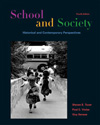 |  School and Society: Historical and Contemporary Perspectives, 4/e Stephen E. Tozer,
The University of Illinois, Chicago
Paul C. Violas
Guy Senese,
Northern Arizona University
School as a Public Institution: The Common-School Era
Professional Vocabulary- character education
- The effort to shape young people's moral and ethical dimensions; took different forms in different historical periods; grounded in religious instruction in the 17th and 18th centuries; more secular and nonsectarian in the common-school era and increasingly secular thereafter.
- decentralization
- In the context of school governance, the shift from a single authority for all schools in a region or district to more local forms of authority.
- feminization of teaching
- A change in the profession of teaching that came about in the 19th century; the majority of schoolteachers were male at the beginning of the 1800s but were female by the end of the Civil War.
- humanitarian reform
- In the context of the 19th century reform movements in the United States, refers to various efforts to address social problems such as alcoholism, slavery, prison cruelty, urban poverty, and discrimination against women.
- normal school
- Initiated in the United States by Horace Mann; a post-secondary or college-level school for the preparation of teachers.
- pedagogy of love
- Horace Mann's view that teachers could be more effective by developing relationships with their students based on affection rather than relationships based on authoritarianism and punishment.
- Prussian model
- The educational system of 19th-century Prussia, which provided free public education, well-educated teachers, and different school experiences for different positions in the social order.
- sectarianism
- In organized religion, the strong focus on differences among various orders (or sects) of the same religion, even to the point of conflict among them.
- university
- In the United States today, a higher education institution that typically has undergraduate and graduate degree programs in multiple fields in the sciences, social sciences, and humanities; has its origins in 17th- and 18th-century colleges and academies as well as in 19th-century normal schools, historically black institutions of higher education, and the European research university.
- urbanization
- Growth in the size and/or number of cities as a society's population shifts from rural to urban life.
|
|



 2002 McGraw-Hill Higher Education
2002 McGraw-Hill Higher Education